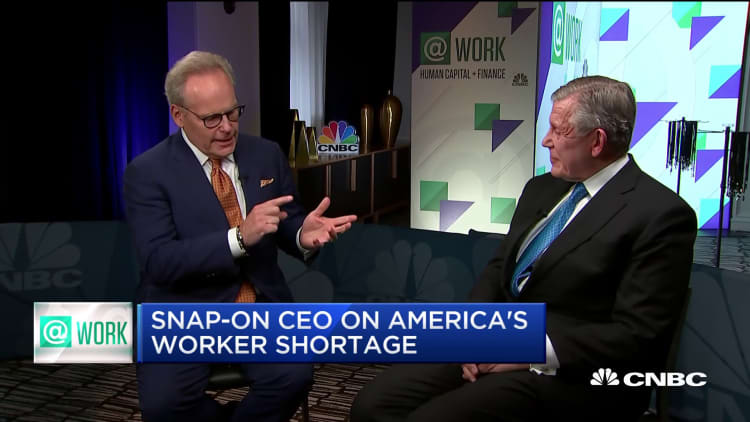
More than 3.5 million Americans quit their jobs every month, and with the unemployment rate at just 3.7%, it can be extremely difficult for employers to find qualified candidates to replace the workers they lose.
So how best to make sure your valued employees aren't among next month's statistics? Our latest CNBC/SurveyMonkey Workplace Happiness Survey reveals some clues.
Our survey of nearly 8,000 working adults in the U.S. shows that a third of workers say they've seriously considered quitting their job in the previous three months, and it's easy to spot the potential quitters by looking at many of the happiness indicators included in the survey.
Those who have seriously considered quitting their job have some substantial differences of opinion when compared with those who haven't considered quitting. In terms of overall job satisfaction, just 16% of workers who've recently considered quitting say they're "very satisfied" with their current job, compared with 62% among everyone else.
The CNBC/SurveyMonkey Workplace Happiness Survey was conducted by SurveyMonkey from June 21–30, 2019, among a national sample of 7,940 workers in the U.S., with a margin of error +/-1.5 percentage points.
No surprise: Salary is top of mind
In today's competitive labor market, salary is top of mind.
A quarter of workers who've considered quitting say that pay is the factor that matters most in determining their happiness at work, while just 17% of those who haven't considered quitting say the same. Those workers who are looking for a way out do indeed feel like they're undercompensated: Just 57% of those who've recently considered quitting say they're "somewhat" or "very well paid" for the work they do, compared with 82% among those who haven't recently considered quitting.
As much as a supervisor might want to give all their workers raises, that's not always possible. Luckily, data reveal several other key factors that contribute to an employee's happiness at work. In fact, we can see some clear, actionable insights that predict an employee's likelihood of quitting. Cash-strapped employers should take note: Most of these tips require no additional spending.
1. Let them know their work is valued.
Just 67% of workers who are thinking about quitting say their colleagues value their contributions at work. Among workers who haven't recently thought about quitting, that number is 90%.
Recognition is such an important aspect of job satisfaction that we include it as one of the five key components — along with pay, opportunity, autonomy, and meaning — in our workplace happiness index. These findings support what everyone knows as common sense: People will be happier if they know their work has value to others.
2. Find them more opportunities to grow.
A solid majority of workers who haven't recently considered quitting their jobs say that their company provides them with "excellent" or "good" opportunities to advance their careers. That number is cut by more than half, to 34%, among those who seriously have considered quitting in the last three months.
Even workers who are successful and satisfied with their jobs need opportunities to stretch themselves by working with new people, developing new skills or taking on new responsibilities.
Young workers who are just beginning their careers are likely to be particularly hungry for new opportunities. Among the Gen Z and millennial workers age 18–24, nearly a quarter (24%) say that "having opportunities to advance" is the most important factor in their overall happiness at work — second only to their desire to "[feel] that your work is meaningful."
Talented workers who aren't challenged enough will seek those challenges elsewhere.
More from @Work
Nine in 10 workers who have a career mentor say they are happy in their jobs
Here is what makes workers the happiest at every age
Dell and Microsoft pour millions into A.I. start-ups that are reshaping the workforce
3. Give them more autonomy.
If new opportunities are scarce at your organization, you might be able to create them for your valued employees by giving them more autonomy. Nine in 10 workers who haven't recently considered quitting say have at least some control over the tasks they do, the way in which they do them, or the timing in which they do them; just 71% of workers who recently have considered quitting say the same.
No one likes to have a micromanager as a boss. Letting your employees take charge of their own work gives them a sense of autonomy, and that often can be a growth opportunity, too.
4. Invest more in new technology.
Not every dollar that a company spends goes to salaries, and employees recognize that as a good thing for them. Organizations that spend on investments in new technology at work are likely to have a happier workforce, as their workers who embrace new technology can gain new skills and feel like they are on the cutting edge of developments in their field.
According to our data, 49% of workers who've recently considered quitting say their company is not spending enough on new technology, compared with just 27% among those who have not considered quitting.
5. Help them find a mentor.
Sometimes unhappy workers just need more guidance than their boss can provide. Having a mentor to provide feedback, advice and prospective opportunities is a huge advantage for any employee. Companies benefit from mentorship, too, as workers are less likely to quit when they say they have someone at work who they consider to be a mentor.
—By Laura Wronski, senior research scientist, SurveyMonkey, and Jon Cohen, chief research officer, SurveyMonkey
For more on tech, transformation and the future of work, join CNBC at the @ Work: People + Machines Summit in San Francisco on November 4. Leaders from Dropbox, Sas, McKinsey and more will teach us how to balance the needs of today with the possibilities of tomorrow, and the winning strategies to compete.





